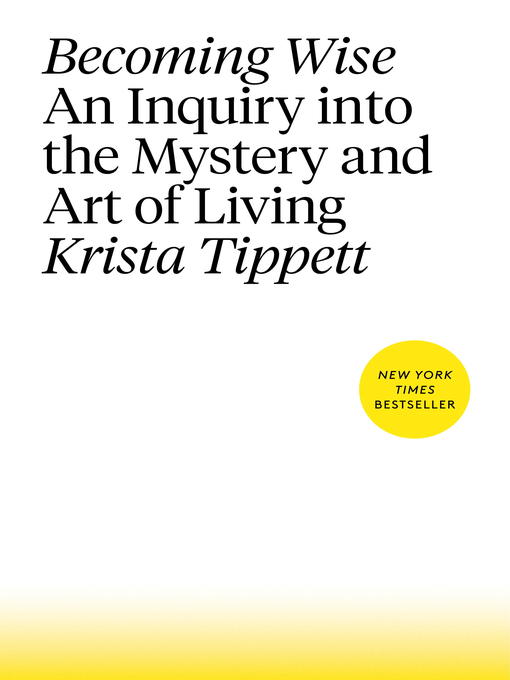
Becoming Wise
An Inquiry into the Mystery and Art of Living
کتاب های مرتبط
- اطلاعات
- نقد و بررسی
- دیدگاه کاربران
نقد و بررسی

Starred review from March 7, 2016
Artful listening is Tippett's (Einstein's God) trademark. Her mellifluous voice, adored by listeners of her radio program and podcast On Being, floats off the pages of this deftly woven collection of interviews. For over a decade, Tippett has interviewed "geniuses in the art of living": scientists, philosophers, poets, playwrights, theologiansâanyone who delves deeply into what it means to be human. "I love the deep savvy about hope that religion tends," she writes, "its reverence for the undervalued virtue of beauty, its seriousness about the common human experience of mystery. Our spiritual lives are where we reckon head-on with the mystery of ourselves, and the mystery of each other." But this is not just a selection of greatest hits. Instead, rooted in Tippett's own keen insight, she provides an interlocking frame based on five themes: words, the body, love, faith, and hope. With dips into Tippett's childhood and early career, readers are embraced by her own struggle, vulnerability, and thirst for meaning. As researcher and TED-talk phenom Brené Brown told Tippett, "Hope is a function of struggle." Tippett's striving here is the grist for creative genius.

February 15, 2016
Five key words serve as guideposts in a search for wisdom. In a thoughtful chronicle of spiritual discovery, Peabody Award-winning broadcaster Tippett (Einstein's God: Conversations About Science and the Human Spirit, 2010, etc.), host of NPR's On Being, draws on conversations with poets, scientists, theologians, and other seekers of truth. The author focuses on five concepts--words, flesh, love, faith, and hope--that she identifies as "raw materials" for the "superstar virtues" of "love, compassion [and] forgiveness." Those virtues are undermined, she writes, by public discourse that "inclines toward despair," fueled by journalism exposing only "what is inadequate, corrupt, catastrophic, and failing." "Our world," she counters, "is abundant with quiet, hidden lives of beauty and courage and goodness." Tippett advocates "generous listening," which she describes as "a willingness to be surprised, to let go of assumptions and take in ambiguity" in order to generate salient questions that may elicit "honesty and eloquence." Throughout the book, Tippett offers excerpts from dialogues with a wide range of people: the playwright and social activist Eve Ensler, the creator of The Vagina Monologues, who has encouraged women to "tell the stories of their lives through the stories of their bodies"; philosopher and humanitarian Jean Vanier, founder of L'Arche movement, a series of communities where able-bodied and mentally disabled people live together as equals; Elizabeth Alexander, who wrote Barack Obama's inaugural poem, invoking "love into a political moment, into a public space"; congressman John Lewis, who described the civil rights community as "a circle of trust"; travel writer, essayist, and novelist Pico Iyer, who has embarked on a "great adventure of the inner world." Spirituality, says Iyer, is "the story of our passionate affair with what is deepest inside us," while religion "is the community, the framework, the tradition, all the other people into which we bring what we find in solitude." A hopeful consideration of the human potential for enlightenment.
COPYRIGHT(2016) Kirkus Reviews, ALL RIGHTS RESERVED.

April 15, 2016
Tippett, recipient of the National Humanities Medal and the host of the acclaimed NPR radio show On Being (originally called Speaking of Faith), is used to taking on the big questions and discussing them with some of the most influential voices in religion, philosophy, and science. This book focuses on turning elements of various spiritual traditionslove, compassion, forgiveness, among theminto actions. In turn, these actions are defined by words, each of which heads a chapter: flesh, love, faith, hope, and words. Pieces of Tippett's conversations about faith feature Reza Aslan, congressman and civil rights activist John Lewis, and author Eve Ensler, among many others, with heart-lifting poetry and the author's musings infusing each chapter. These conversationsand Tippett's writing throughoutmake for deep and thought-provoking reading. This is not another make-your-life-better how-to manual, of which there are far too many, but there are occasions where Tippett's rarefied language obscures rather than enlightens. Nevertheless, those willing to take the time to walk with Tippett and her fellow conversationalists will find much to ponder here.(Reprinted with permission of Booklist, copyright 2016, American Library Association.)

























دیدگاه کاربران